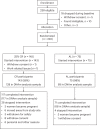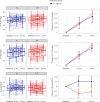Effect of long-term caloric restriction on DNA methylation measures of biological aging in healthy adults from the CALERIE trial
- PMID: 37118425
- PMCID: PMC10148951
- DOI: 10.1038/s43587-022-00357-y
Effect of long-term caloric restriction on DNA methylation measures of biological aging in healthy adults from the CALERIE trial
Erratum in
-
Author Correction: Effect of long-term caloric restriction on DNA methylation measures of biological aging in healthy adults from the CALERIE trial.Nat Aging. 2023 Jun;3(6):753. doi: 10.1038/s43587-023-00432-y. Nat Aging. 2023. PMID: 37161091 Free PMC article. No abstract available.
Abstract
The geroscience hypothesis proposes that therapy to slow or reverse molecular changes that occur with aging can delay or prevent multiple chronic diseases and extend healthy lifespan1-3. Caloric restriction (CR), defined as lessening caloric intake without depriving essential nutrients4, results in changes in molecular processes that have been associated with aging, including DNA methylation (DNAm)5-7, and is established to increase healthy lifespan in multiple species8,9. Here we report the results of a post hoc analysis of the influence of CR on DNAm measures of aging in blood samples from the Comprehensive Assessment of Long-term Effects of Reducing Intake of Energy (CALERIE) trial, a randomized controlled trial in which n = 220 adults without obesity were randomized to 25% CR or ad libitum control diet for 2 yr (ref. 10). We found that CALERIE intervention slowed the pace of aging, as measured by the DunedinPACE DNAm algorithm, but did not lead to significant changes in biological age estimates measured by various DNAm clocks including PhenoAge and GrimAge. Treatment effect sizes were small. Nevertheless, modest slowing of the pace of aging can have profound effects on population health11-13. The finding that CR modified DunedinPACE in a randomized controlled trial supports the geroscience hypothesis, building on evidence from small and uncontrolled studies14-16 and contrasting with reports that biological aging may not be modifiable17. Ultimately, a conclusive test of the geroscience hypothesis will require trials with long-term follow-up to establish effects of intervention on primary healthy-aging endpoints, including incidence of chronic disease and mortality18-20.
© 2023. The Author(s).
Conflict of interest statement
D.L.C. and D.W.B. are listed as inventors on a Duke University and University of Otago invention, DunedinPACE, that was licensed to a commercial entity. The other authors declare no competing interests.
Figures


References
Publication types
MeSH terms
Grants and funding
LinkOut - more resources
Full Text Sources

